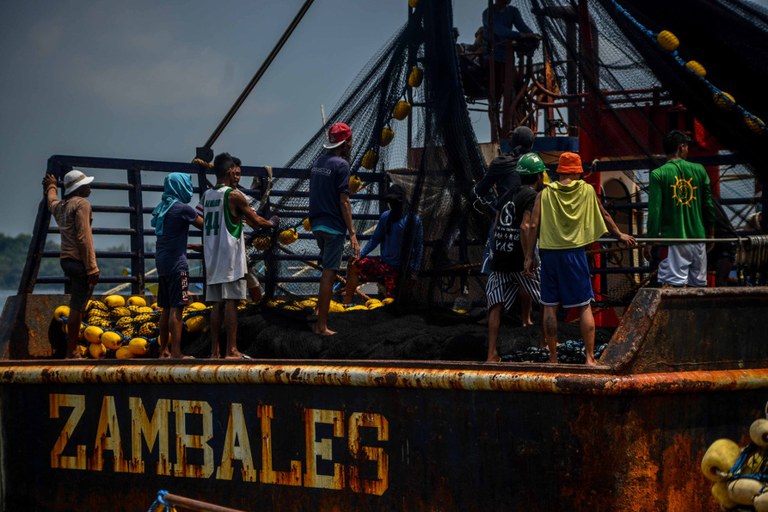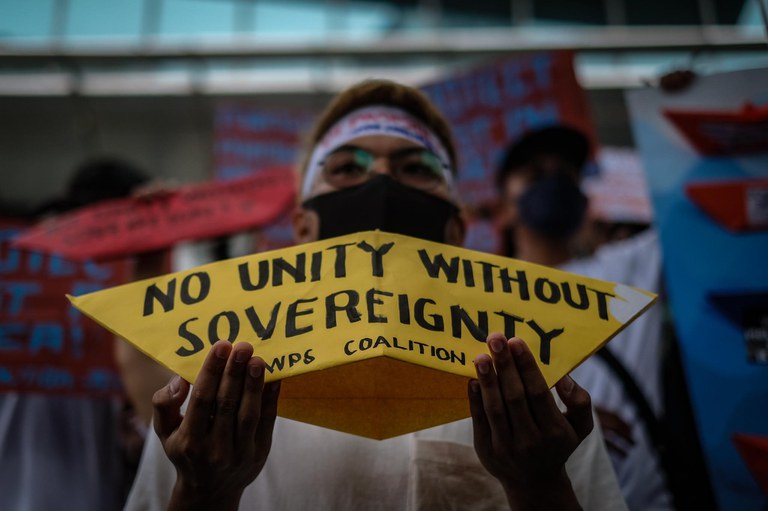Chinese troops drive away fishing vessels from disputed waters
2022.09.13
 In this screengrab from a video by a Chinese state-run channel, Chinese troops take part in a planning meeting on Mischief Reef in the South China Sea.
In this screengrab from a video by a Chinese state-run channel, Chinese troops take part in a planning meeting on Mischief Reef in the South China Sea.
A newly emerged video made by the Chinese military shows how People’s Liberation Army (PLA) troops on China-occupied islands in the South China Sea have been driving away fishing boats from neighboring countries despite a tribunal ruling against Chinese claims.
During last weekend’s Mid-Autumn Festival holiday, soldiers stationed on Mischief Reef, an artificial island that China has occupied since 1994, “successfully” warned away an unidentified foreign fishing boat from surrounding waters, state-run national military channel CCTV-7 reported on Monday.
In 2016, an international tribunal in The Hague ruled that Mischief Reef, located 250 kilometers east of Palawan Island in the Philippines, was a low-tide elevation and therefore could not have a 12-mile territorial sea, thereby invalidating China’s sovereignty claim over it.
It also lies within the Philippines’ exclusive economic zone (EEZ) and has been a traditional fishing ground for Filipino fishermen for decades. An EEZ is an area of the sea in which a sovereign state has exclusive rights regarding the exploration and use of marine resources.
The CCTV clip showed armed soldiers, assisted by radars and warships, reacting to a sighting of a fishing boat of “unknown nationality” and using loudspeakers to chase it away.
Troops also conducted regular training with sea and air targets in order to bolster combat readiness, the report said.
Mischief Reef, also claimed by the Philippines, Taiwan and Vietnam, is one of China’s first reclaimed and fortified islands and also the biggest. It boasts a large harbor, a military base with missile systems and a 3,000-meter (1.9 mile) runway.
In March, U.S. Indo-Pacific commander Adm. John C. Aquilino said that the construction of missile arsenals, aircraft hangars, radar systems and other military facilities at Mischief Reef, Subi Reef and Fiery Cross “appeared to have been completed.”
“They threaten all nations who operate in the vicinity and all the international sea and airspace,” he added.

The CCTV report also mentioned other China-occupied islands within the Spratly archipelago including the Johnson South, Fiery Cross, Subi, Cuarteron, Gaven and Hughes reefs, where it said “soldiers and officers stay on guard night and day” to protect China’s sovereignty.
All the features were deemed rocks and China’s sweeping maritime claims illegal by the 2016 tribunal ruling but Beijing has always refused to accept the court’s decision.
Six parties claim parts of the South China Sea but China’s claims are the most expansive.
Apart from restricting access of fishermen from other countries to their old fishing grounds, Chinese Coast Guard and law enforcement ships have also been accused of harassing their fishing vessels.
Indonesian media reported that on Saturday, a Chinese Coast Guard ship was caught “roaming inside Indonesia’s EEZ” and harassing much smaller Indonesian fishing boats in the North Natuna Sea.
Locals also said that Chinese fishing vessels had been operating illegally in the sea over the past two years. Some of them even came as close as 30 nautical miles (55.6 kilometers) from Pulau Laut, the outermost island in the Natuna archipelago.

For their part, Filipino fishermen have been complaining about Chinese activities near Scarborough Shoal, another fishing ground in the Philippines’ EEZ.
“Given the increase of both demand and scarcity, it would be prudent to assume that long-term access to what remains of fishing stocks in the South China Sea would be among the key priorities for Beijing,” said Thomas Daniel, a senior fellow at the Institute of Strategic and International Studies (ISIS) in Malaysia.
“It has been long-standing practice for state affiliated vessels from China, mainly the Coast Guard and its constituent agencies, and its maritime militia, to harass and deter what it sees as illegal fishing in its EEZs,” Daniel said.
“While Vietnam and the Philippines bore much of the early brunt, incidents are now increasingly observed in the southern reaches of the South China Sea, affecting Malaysian and Indonesian fishermen,” the analyst said.
Since President Ferdinand Marcos Jr. took office in June, the Philippine government has lodged 48 diplomatic protests against Beijing over the aggressive behavior of Chinese ships in the South China Sea, which Manila calls the West Philippine Sea.
Last week, Foreign Affairs Assistant Secretary Maria Angela Ponce told a hearing at the Philippine Senate’s Foreign Relations Committee that “the protests covered the illegal presence of foreign fishing and maritime militia vessels, illegal fishing, harassment of fishermen and enforcement agencies, and unauthorized marine scientific research,” according to Philippine media.
Sen. Imee Marcos, head of the committee, was quoted as saying that diplomatic protests have not been effective so far and the government needed to come up with a more effective strategy to counter China’s increasing presence in the South China Sea.







